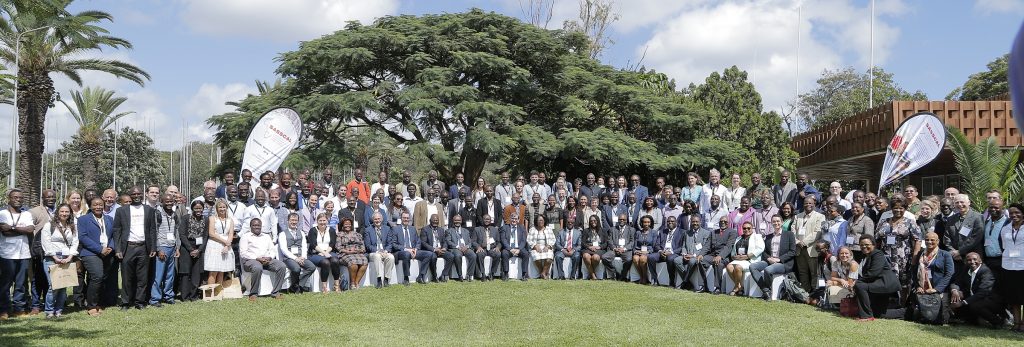The SASSCAL Science Symposium was held on 16-20 April 2018 in Lusaka, Zambia. It was hosted by the Zambia Ministry of Higher Education and funded by the German Federal Ministry of Education and Research (BMBF). The theme of the symposium was Science Diplomacy Supporting Climate Change Action in SADC.

The SASSCAL Science Symposium attracted participants from thirteen different countries, namely; Zambia, Botswana, Angola, South Africa, Namibia, Germany, Spain, Italy, The Netherlands, Zimbabwe, Ghana, Finland and Czech Republic. The Symposium was attended by over 300 participants. Papers were presented in the various sub themes of the symposium; Water-Climate-Food Nexus, Biodiversity – Climate-Food Security, Forest Conservation-Climate-Livelihoods, Agriculture-Climate-Food Security, Data, Technology and Infrastructure, Adaptive Land Management and Capacity Development in SADC. More than 150 papers were presented during this symposium.
Science Policy Forum
The symposium was preceded by the SASSCAL Science policy forum. The forum was convened to promote dialogue between policy makers, scientists, academia and other stakeholders on issues of climate change in the region. Research should be African driven and should have long term sustainability. Dr Kraus who represented BMBF pledged further commitment to SASSCAL for more than a decade into the future so long as the outputs are relevant locally and enjoy international standards, He emphasised the fact that capacity development is very important in the region and there is need for partnerships and corporation with other existing initiatives. SASSCAL was applauded for its contribution to research and knowledge economy in the region. Taking a regional approach and integration in its policies is also a vital value addition from SASSCAL programmes that was highlighted. In her remarks, Dr Jane Olwoch, SASSCAL Executive Director stressed the value of partnerships in responding to climate change as it also supports the UNFCCC principle of “Common but Differentiated Responsibilities and Respective Capabilities”.
Official Opening
The Symposium was officially opened by the Zambia Minister of Higher Education Hon. Prof Nkandu Luo. The Minister said the symposium presented an ideal platform for SASSCAL to show its relevance to the community it serves. The communities and decision makers are the most important people who should know the realities of climate change. Findings that will be presented should help them to adapt to the effects of climate change. The Minister also challenged SASSCAL to ensure that all SADC countries are represented and benefit from its initiatives. In conclusion Hon Nkandu Luo stated that it is important for research findings to be translated to easier language and be disseminated across the continent so that people can appreciate and look after their resources.
Other key Symposium events
The Official Launch of the SASSCAL Book
The technical highlight of the symposium was the launch of the SASSCAL book on 18 April 2018.

The book is the culmination of SASSCAL1.0 research which supported a Research Portfolio comprising of 88 projects. Altogether, more than 500 individuals and over 80 academic, governmental and non-governmental institutions were involved in the research tasks of the first phase of SASSCAL (SASSCAL 1.0). The book therefore integrates and brings together the results of the SASSCAL researchers.
Side Events
Three side events were hosted during the symposium:
- The extreme climate index (EXI) hosted by ARC/XF, SASSCAL and CSIR
- SEACRIFOG Stakeholder consultation workshop hosted by SEACRIFOG
- Launch of the National Hydrogeological map of Zambia hosted by BGR and WARMA
There were three excursions for the symposium. The first excursion was on Thursday after the closing ceremony to the local sites within Lusaka including the Old Kenneth Kaunda house and Lusaka National museum. Friday 20 April excursions to Chaminuka game reserve and Chirundu Fossil forest were full day excursions.
Official Closing
The SASSCAL Science symposium was officially closed on Thursday 20 April 2018 with an agreement that policy makers from various countries should take the research findings and interpret, integrate and inform policy. All member states are still committed to the SASSCAL initiative. SASSCAL is relevant to the needs of the region and will continue to provide demand driven research and capacity development. The closing ceremony was also marked by awards giving for best poster, oral and overall presentation.




